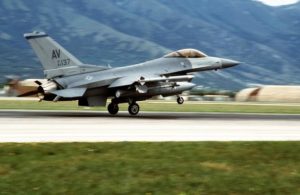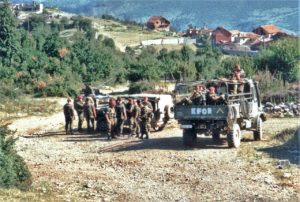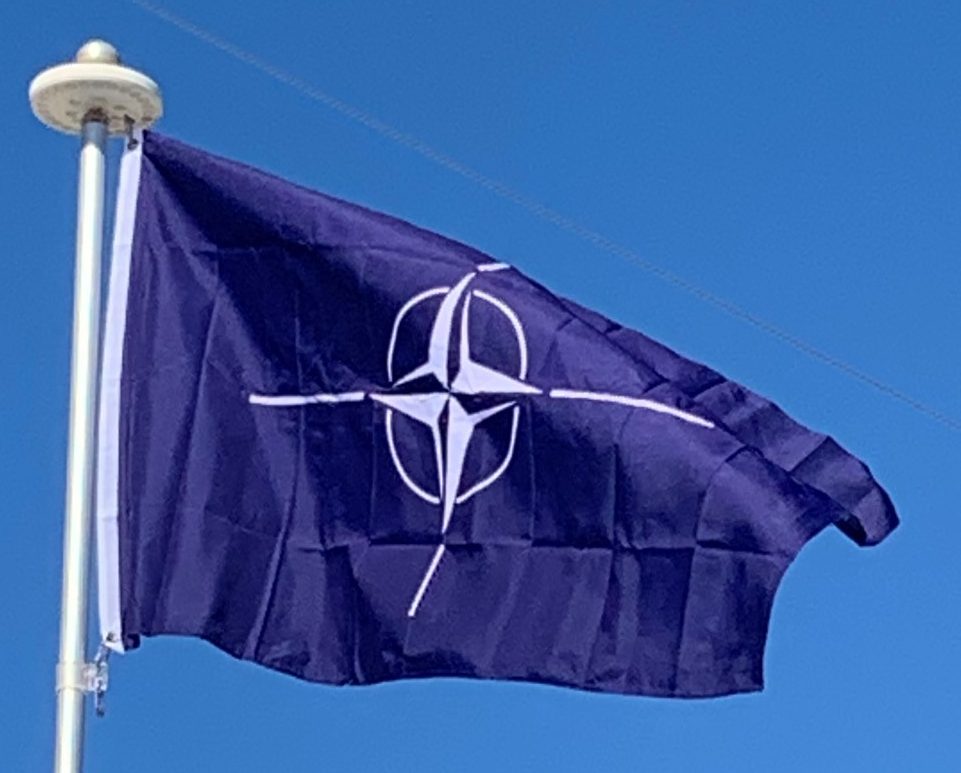
On 10 and 11 April 1994, during the Bosnian War, the United Nations Protection Force called in air strikes to protect the Goražde safe area, resulting in the bombing of a Bosnian Serb military command outpost near Goražde by two US F-16 jets acting under NATO direction. This resulted in the taking of 150 U.N. personnel hostage on 14 April. On 16 April a British Sea Harrier was shot down over Goražde by Serb forces. A two-week NATO bombing campaign, Operation Deliberate Force, began in August 1995 against the Army of the Republika Srpska, after the Srebrenica massacre.
NATO air strikes that year helped bring the Yugoslav wars to an end, resulting in the Dayton Agreement in November 1995. As part of this agreement, NATO deployed a UN-mandated peacekeeping force, under Operation Joint Endeavor, named IFOR. Almost 60,000 NATO troops were joined by forces from non-NATO nations in this peacekeeping mission. This transitioned into the smaller SFOR, which started with 32,000 troops initially and ran from December 1996 until December 2004, when operations were then passed onto European Union Force Althea. Following the lead of its member nations, NATO began to award a service medal, the NATO Medal, for these operations.
Kosovo Intervention:
In an effort to stop Slobodan Milošević’s Serbian-led crackdown on KLA separatists and Albanian civilians in Kosovo, the United Nations Security Council passed Resolution 1199 on 23 September 1998 to demand a ceasefire. Negotiations under US Special Envoy Richard Holbrooke broke down on 23 March 1999, and he handed the matter to NATO, which started a 78-day bombing campaign on 24 March 1999. Operation Allied Force targeted the military capabilities of what was then the Federal Republic of Yugoslavia. During the crisis, NATO also deployed one of its international reaction forces, the ACE Mobile Force (Land), to Albania as the Albania Force (AFOR), to deliver humanitarian aid to refugees from Kosovo.
Though the campaign was criticized for high civilian casualties, including bombing of the Chinese embassy in Belgrade, Milošević finally accepted the terms of an international peace plan on 3 June 1999, ending the Kosovo War. On 11 June, Milošević further accepted UN resolution 1244, under the mandate of which NATO then helped establish the KFOR peacekeeping force. Nearly one million refugees had fled Kosovo, and part of KFOR’s mandate was to protect the humanitarian missions, in addition to deterring violence. In August–September 2001, the alliance also mounted Operation Essential Harvest, a mission disarming ethnic Albanian militias in the Republic of Macedonia. As of 1 December 2013, 4,882 KFOR soldiers, representing 31 countries, continue to operate in the area.

The US, the UK, and most other NATO countries opposed efforts to require the UN Security Council to approve NATO military strikes, such as the action against Serbia in 1999, while France and some others claimed that the alliance needed UN approval. The US/UK side claimed that this would undermine the authority of the alliance, and they noted that Russia and China would have exercised their Security Council vetoes to block the strike on Yugoslavia, and could do the same in future conflicts where NATO intervention was required, thus nullifying the entire potency and purpose of the organization. Recognizing the post-Cold War military environment, NATO adopted the Alliance Strategic Concept during its Washington summit in April 1999 that emphasized conflict prevention and crisis management.
War in Afghanistan:
The September 11 attacks in the United States caused NATO to invoke Article 5 of the NATO Charter for the first time in the organization’s history. The Article says that an attack on any member shall be considered to be an attack on all. The invocation was confirmed on 4 October 2001 when NATO determined that the attacks were indeed eligible under the terms of the North Atlantic Treaty. The eight official actions taken by NATO in response to the attacks included Operation Eagle Assist and Operation Active Endeavour, a naval operation in the Mediterranean Sea which is designed to prevent the movement of terrorists or weapons of mass destruction, as well as enhancing the security of shipping in general which began on 4 October 2001.
